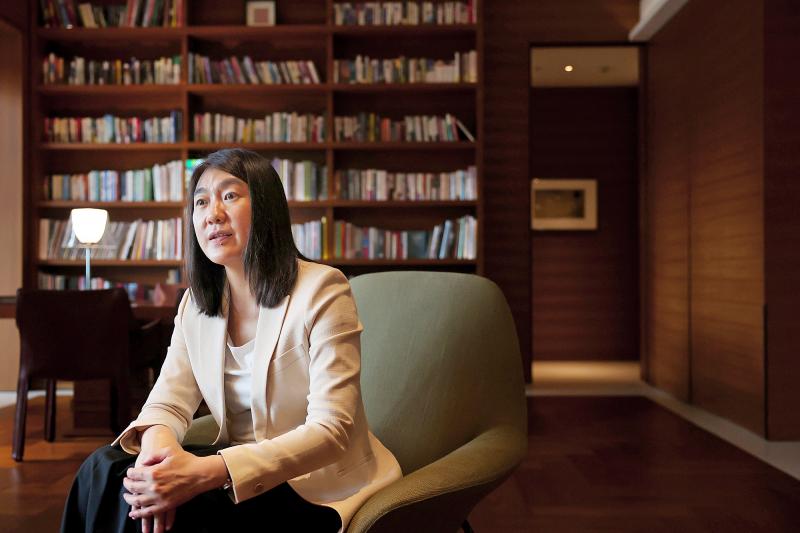Eslite Spectrum Corp (誠品生活), which runs the Eslite bookstore chain, department stores and leisure lifestyle services in Taiwan and abroad, aims to achieve revenue of NT$18.5 billion to NT$19 billion (US$628.9 million to US$645.93 million) this year after extending losses in the first quarter, chairwoman Mercy Wu (吳旻潔) said in an interview with the Chinese-language Commercial Times yesterday.
The Taipei-based group is struggling to swing back to profit after posting losses of NT$1.46 per share in the January-to-March period, as the COVID-19 pandemic weighs on its popular Eslite bookstores and department stores.
Eslite Spectrum has sought to survive by adopting an online-merges-offline (OMO) business model that enables offline retailers to tap into existing e-commerce platforms with better utilization of its business network and lower costs, the newspaper quoted Wu as saying.

Photo: CNA
The company incurred losses per share of NT$4.82 last year for the first time since its listing on the over-the-counter Taipei Exchange. Wu attributed the poor results to the COVID-19 pandemic and capital spending to create an online sales network.
The chilling effect was most evident in Eslite branches at transportation hubs and popular locations in northern Taiwan, she said.
The company last year launched a three-year transformation geared to restore annual revenue to the pre-pandemic level of NT$20 billion next year and boost it to NT$30 billion thereafter.
Reaching the NT$30 billion target would mean the company’s sales channels are growing, and its emphasis on cultural tourism, community life and e-commerce is paying off, Wu said in the interview, adding that the effort must eventually lead to improved earnings to be called successful.
Eslite Spectrum plans to open large flagship bookstores and small neighborhood outlets accross Taiwan as well as overseas to increase customers and expand its business scale, Wu told the newspaper.
The pandemic is reshaping business districts around Taiwan, with small retailers being forced out of the market while demand for food, beverages and recreation prove stronger than regular shopping, Eslite Spectrum said.
Further, the business mix and leasing structure of commercial properties have been forced to change, but consumer activity at the neighborhood level remains active, the company said.
Affiliate Eslite Hotel (誠品行旅) at the Songshan Cultural and Creative Park (松山文創園區) in Taipei is currently wooing domestic tourists before the government reopens Taiwan to foreign tourists, it said.

SEEKING CLARITY: Washington should not adopt measures that create uncertainties for ‘existing semiconductor investments,’ TSMC said referring to its US$165 billion in the US Taiwan Semiconductor Manufacturing Co (TSMC, 台積電) told the US that any future tariffs on Taiwanese semiconductors could reduce demand for chips and derail its pledge to increase its investment in Arizona. “New import restrictions could jeopardize current US leadership in the competitive technology industry and create uncertainties for many committed semiconductor capital projects in the US, including TSMC Arizona’s significant investment plan in Phoenix,” the chipmaker wrote in a letter to the US Department of Commerce. TSMC issued the warning in response to a solicitation for comments by the department on a possible tariff on semiconductor imports by US President Donald Trump’s

The government has launched a three-pronged strategy to attract local and international talent, aiming to position Taiwan as a new global hub following Nvidia Corp’s announcement that it has chosen Taipei as the site of its Taiwan headquarters. Nvidia cofounder and CEO Jensen Huang (黃仁勳) on Monday last week announced during his keynote speech at the Computex trade show in Taipei that the Nvidia Constellation, the company’s planned Taiwan headquarters, would be located in the Beitou-Shilin Technology Park (北投士林科技園區) in Taipei. Huang’s decision to establish a base in Taiwan is “primarily due to Taiwan’s talent pool and its strength in the semiconductor

Industrial production expanded 22.31 percent annually last month to 107.51, as increases in demand for high-performance computing (HPC) and artificial intelligence (AI) applications drove demand for locally-made chips and components. The manufacturing production index climbed 23.68 percent year-on-year to 108.37, marking the 14th consecutive month of increase, the Ministry of Economic Affairs said. In the first four months of this year, industrial and manufacturing production indices expanded 14.31 percent and 15.22 percent year-on-year, ministry data showed. The growth momentum is to extend into this month, with the manufacturing production index expected to rise between 11 percent and 15.1 percent annually, Department of Statistics

An earnings report from semiconductor giant and artificial intelligence (AI) bellwether Nvidia Corp takes center stage for Wall Street this week, as stocks hit a speed bump of worries over US federal deficits driving up Treasury yields. US equities pulled back last week after a torrid rally, as investors turned their attention to tax and spending legislation poised to swell the US government’s US$36 trillion in debt. Long-dated US Treasury yields rose amid the fiscal worries, with the 30-year yield topping 5 percent and hitting its highest level since late 2023. Stocks were dealt another blow on Friday when US President Donald